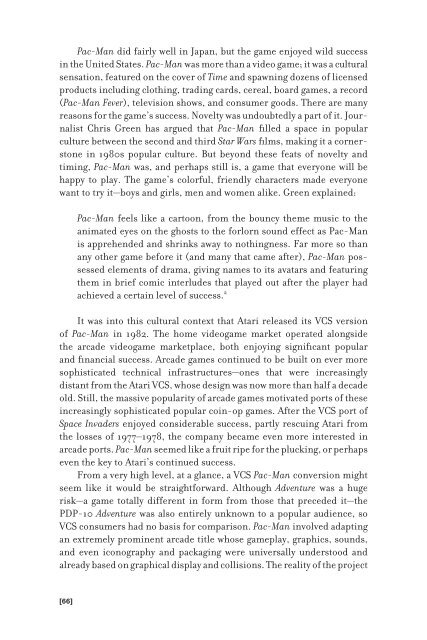Racing the Beam : the Atari Video Computer System - Index of
Racing the Beam : the Atari Video Computer System - Index of
Racing the Beam : the Atari Video Computer System - Index of
Create successful ePaper yourself
Turn your PDF publications into a flip-book with our unique Google optimized e-Paper software.
Pac-Man did fairly well in Japan, but <strong>the</strong> game enjoyed wild success<br />
in <strong>the</strong> United States. Pac-Man was more than a video game; it was a cultural<br />
sensation, featured on <strong>the</strong> cover <strong>of</strong> Time and spawning dozens <strong>of</strong> licensed<br />
products including clothing, trading cards, cereal, board games, a record<br />
(Pac-Man Fever), television shows, and consumer goods. There are many<br />
reasons for <strong>the</strong> game’s success. Novelty was undoubtedly a part <strong>of</strong> it. Journalist<br />
Chris Green has argued that Pac-Man fi lled a space in popular<br />
culture between <strong>the</strong> second and third Star Wars fi lms, making it a cornerstone<br />
in 1980s popular culture. But beyond <strong>the</strong>se feats <strong>of</strong> novelty and<br />
timing, Pac-Man was, and perhaps still is, a game that everyone will be<br />
happy to play. The game’s colorful, friendly characters made everyone<br />
want to try it—boys and girls, men and women alike. Green explained:<br />
[66]<br />
Pac-Man feels like a cartoon, from <strong>the</strong> bouncy <strong>the</strong>me music to <strong>the</strong><br />
animated eyes on <strong>the</strong> ghosts to <strong>the</strong> forlorn sound effect as Pac-Man<br />
is apprehended and shrinks away to nothingness. Far more so than<br />
any o<strong>the</strong>r game before it (and many that came after), Pac-Man possessed<br />
elements <strong>of</strong> drama, giving names to its avatars and featuring<br />
<strong>the</strong>m in brief comic interludes that played out after <strong>the</strong> player had<br />
achieved a certain level <strong>of</strong> success. 2<br />
It was into this cultural context that <strong>Atari</strong> released its VCS version<br />
<strong>of</strong> Pac-Man in 1982. The home videogame market operated alongside<br />
<strong>the</strong> arcade videogame marketplace, both enjoying signifi cant popular<br />
and fi nancial success. Arcade games continued to be built on ever more<br />
sophisticated technical infrastructures—ones that were increasingly<br />
distant from <strong>the</strong> <strong>Atari</strong> VCS, whose design was now more than half a decade<br />
old. Still, <strong>the</strong> massive popularity <strong>of</strong> arcade games motivated ports <strong>of</strong> <strong>the</strong>se<br />
increasingly sophisticated popular coin-op games. After <strong>the</strong> VCS port <strong>of</strong><br />
Space Invaders enjoyed considerable success, partly rescuing <strong>Atari</strong> from<br />
<strong>the</strong> losses <strong>of</strong> 1977–1978, <strong>the</strong> company became even more interested in<br />
arcade ports. Pac-Man seemed like a fruit ripe for <strong>the</strong> plucking, or perhaps<br />
even <strong>the</strong> key to <strong>Atari</strong>’s continued success.<br />
From a very high level, at a glance, a VCS Pac-Man conversion might<br />
seem like it would be straightforward. Although Adventure was a huge<br />
risk—a game totally different in form from those that preceded it—<strong>the</strong><br />
PDP-10 Adventure was also entirely unknown to a popular audience, so<br />
VCS consumers had no basis for comparison. Pac-Man involved adapting<br />
an extremely prominent arcade title whose gameplay, graphics, sounds,<br />
and even iconography and packaging were universally understood and<br />
already based on graphical display and collisions. The reality <strong>of</strong> <strong>the</strong> project


